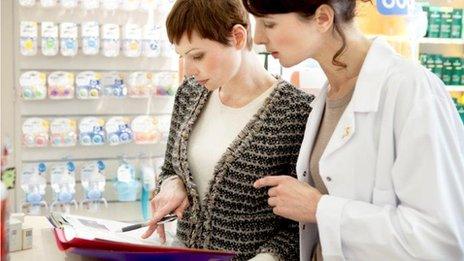More to pharmacies than meets the eye
- Published

To many people, their local pharmacy is the place where they pick up their medicines and perhaps their toiletries.
But potentially that is just the tip of the iceberg.
Over the past decade or so pharmacists have been given more and more responsibilities in the NHS, just as nurses have.
It means many now offer blood pressure checks, and cholesterol and blood glucose level tests alongside pregnancy testing and sexually transmitted infection services.
Colds and flu can often be dealt with there, without bothering a GP at all, while some even provide stop smoking services and prescribe drugs and treatments.
But despite their expanding remit, much of the public is oblivious.
Less than a third of people asked in a recent YouGov poll of over 2,000 people were aware of what pharmacists could offer.
'Bursting at the seams'
So now , which represents the industry, is launching a drive to change perceptions.
It is running a two-year promotional campaign, Dispensing Health, to promote what the UK's 13,000 community pharmacies can do.
"Pharmacy is the third largest health profession (in the health sector) after medicine and nursing," says Pharmacy Voice chief executive Prof Robert Darracott. "Yet people still don't really know who we are and what we can do."
He says the aim of the campaign is to "challenge the traditional view of pharmacies as simply dispensers of medicine" so that they are seen as a place where illness can be treated and good health promoted.
The push has received the backing of GPs with both the Royal College of GPs and NHS Alliance, which represents community services, putting their names to the campaign.
Making sure the potential of pharmacies is realised could also have important implications for the rest of the health service too.
A by NHS England into the A&E system, which was published in November, said pharmacies were an "under-used" resource that if tapped into could take the pressure off GPs who in turn would then have time to take on some of the workload of hospitals.
Dr Mike Dixon, of the NHS Alliance, says: "Community pharmacy is perfectly positioned to take the strain from GPs and A&E departments that are bursting at the seams."
It is thought as many as one in seven GP appointments could be dealt with by pharmacies - about 40m a year.
If that was to happen it could have a profound effect on the entire NHS.